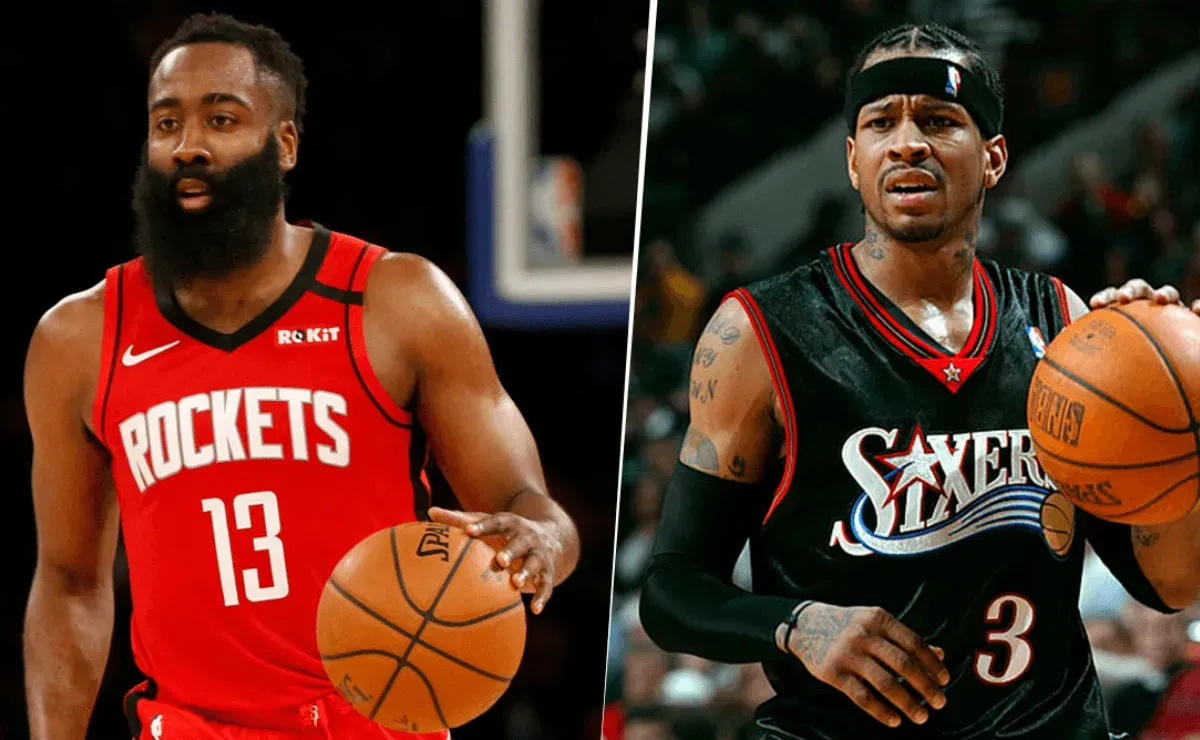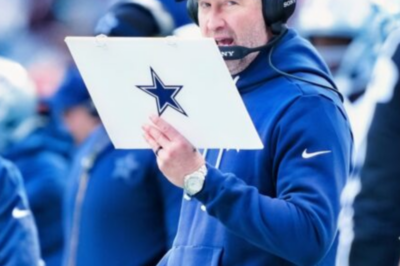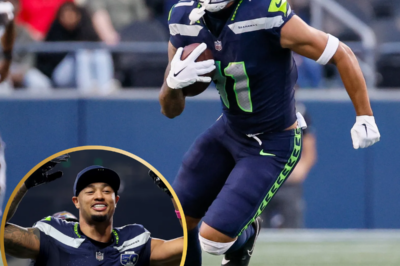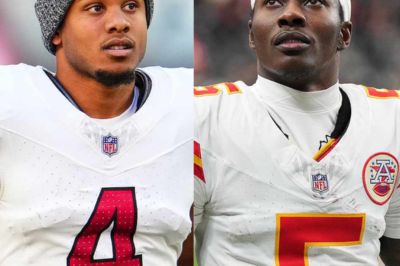James Harden Just SMASHED Allen Iverson’s Legacy—Here’s the UNDENIABLE Proof
The NBA has been graced by a plethora of talented guards throughout its storied history, but few have captured the imagination of basketball fans like Allen Iverson and James Harden. Both players are MVPs, scoring champions, and cultural icons in their own right.
Yet, as the conversation about all-time greatness intensifies, a compelling argument emerges: James Harden, with his unique skill set, statistical dominance, and transformative impact on the game, stands above Allen Iverson in the pantheon of NBA legends.
This article will delve deep into the careers, achievements, playstyles, and legacies of both stars, using advanced metrics and contextual analysis to explain why James Harden is greater all-time than Allen Iverson.
Career Overview: Harden vs. Iverson
Allen Iverson, known as “The Answer,” entered the NBA in 1996 as the first overall pick by the Philadelphia 76ers.
Standing at just six feet tall, Iverson defied expectations with his fearless play, dazzling crossovers, and relentless scoring ability.
He quickly became the face of the 76ers franchise, earning the 1997 Rookie of the Year award, four scoring titles, an MVP award in 2001, and 11 All-Star selections over a 14-year career.
James Harden, “The Beard,” was drafted third overall by the Oklahoma City Thunder in 2009. Initially a sixth man, Harden blossomed into a superstar after being traded to the Houston Rockets in 2012.

Harden’s career trajectory skyrocketed as he became a perennial MVP candidate, a three-time scoring champion, an assist leader, and a 10-time All-Star (as of 2024). His ability to manipulate defenses, draw fouls, and orchestrate offenses has made him one of the most unguardable players in NBA history.
While both players have left indelible marks on the league, Harden’s sustained excellence, versatility, and statistical achievements set him apart in the conversation of all-time greatness.
Scoring Prowess: Efficiency vs. Volume
Both Iverson and Harden are renowned for their scoring abilities, but the manner in which they achieve their points is fundamentally different.
Allen Iverson’s Scoring Style
Iverson was a volume scorer, capable of putting up points in bunches despite facing relentless defensive attention.
His quickness, agility, and ball-handling allowed him to attack the rim fearlessly, often absorbing contact from much larger defenders.
Iverson led the league in scoring four times, peaking at 33.0 points per game in the 2005-06 season. Over his career, he averaged 26.7 points per game—a remarkable feat for a player of his size.
However, Iverson’s scoring came at the expense of efficiency. He shot 42.5% from the field and 31.3% from three-point range over his career, with a true shooting percentage (TS%) of 51.8%.
Iverson’s high usage rate and willingness to take difficult shots were both a blessing and a curse, as he often carried undermanned teams but also struggled with shot selection.
James Harden’s Scoring Style
Harden, on the other hand, revolutionized NBA offense with his combination of three-point shooting, foul drawing, and isolation play.
Harden led the league in scoring three times, peaking at 36.1 points per game in the 2018-19 season—one of the highest marks in modern NBA history.
Unlike Iverson, Harden’s scoring is rooted in efficiency. He boasts a career field goal percentage around 44%, a three-point percentage near 36%, and a true shooting percentage over 61% during his prime seasons.
Harden’s mastery of the step-back three-pointer, ability to finish through contact, and proficiency at drawing fouls (often leading the league in free throw attempts) have made him one of the most efficient high-volume scorers ever.
His offensive game is tailored to exploit modern NBA spacing and analytics, making him a nightmare for opposing defenses.
Comparative Analysis
While Iverson’s scoring was electrifying and relentless, Harden’s blend of volume and efficiency is unprecedented.

Advanced metrics such as Player Efficiency Rating (PER), Win Shares, and Box Plus-Minus (BPM) consistently rate Harden’s offensive impact higher than Iverson’s.
Harden’s ability to create efficient offense for himself and his teammates elevates his scoring beyond mere points per game.
Playmaking and Passing Ability
One of the most significant distinctions between Harden and Iverson lies in their playmaking abilities.
Allen Iverson as a Playmaker
Iverson was primarily a scorer, though he did average 6.2 assists per game for his career.
His passing was often a result of collapsing defenses rather than orchestrated playmaking.
Iverson’s style was predicated on attacking the basket, and while he could find open teammates, he was not known for running complex offenses or elevating the play of others to the same extent as elite point guards.
James Harden as a Playmaker
Harden, conversely, is one of the most prolific playmakers of his era. He has averaged over 7 assists per game for his career, including two seasons leading the league in assists.
Harden’s ability to read defenses, manipulate pick-and-rolls, and deliver pinpoint passes to shooters and roll men has redefined the role of a modern guard.
Harden’s offensive genius lies in his dual threat as both a scorer and facilitator.
Defenses must choose between double-teaming him (opening up teammates for easy baskets) or guarding him one-on-one (risking a barrage of points).
Harden’s vision, timing, and creativity make him the engine of any offense he runs.
Comparative Analysis
While Iverson was a capable passer, Harden is in a different tier as a playmaker.
His assist numbers, assist percentage, and overall offensive impact as a creator far surpass Iverson’s.
Harden’s ability to control the tempo, create for others, and generate efficient offense is a hallmark of his greatness.
Advanced Metrics and Statistical Dominance

To fully appreciate Harden’s superiority, it’s essential to examine advanced metrics that capture a player’s overall impact.
Player Efficiency Rating (PER)
PER is a comprehensive statistic that summarizes a player’s per-minute productivity.
Harden boasts a career PER of around 24, peaking at over 30 during his MVP seasons. Iverson, by comparison, has a career PER of 20.9, with his best season reaching 26.5.
Win Shares
Win Shares estimate the number of wins a player produces for their team. Harden has accumulated over 150 career Win Shares (as of 2024), while Iverson finished his career with 99.
Harden’s higher total is a testament to his sustained excellence and ability to contribute to winning basketball.
Box Plus-Minus (BPM) and Value Over Replacement Player (VORP)
BPM and VORP are advanced stats that measure a player’s overall impact relative to a league-average player.
Harden consistently ranks among the league leaders in both categories, reflecting his all-around dominance. Iverson’s numbers, while strong, do not reach the same heights.
True Shooting Percentage (TS%)
Harden’s career TS% is significantly higher than Iverson’s, reflecting his more efficient scoring.
This matters immensely in evaluating overall offensive impact, as efficient scoring is more valuable in the modern NBA.
Comparative Analysis
Across virtually every advanced metric, Harden outpaces Iverson.
His combination of scoring, playmaking, and efficiency translates into greater value for his teams and a higher overall impact on the game.
Playoff Performance and Clutch Moments
Greatness is often defined by playoff success and clutch moments. Both Iverson and Harden have had memorable postseason runs, but their legacies differ.
Allen Iverson’s Playoff Legacy
Iverson’s most iconic moment came during the 2001 NBA Finals, where he led an underdog 76ers team to a Game 1 victory over the Los Angeles Lakers, famously stepping over Tyronn Lue after a clutch shot.
Iverson averaged 29.7 points per game in the playoffs and had several legendary performances, carrying teams with limited supporting casts deep into the postseason.
However, Iverson’s teams often fell short against superior opponents, and he never won an NBA championship.
His playoff efficiency also dipped, with shooting percentages declining under increased defensive pressure.
James Harden’s Playoff Legacy

Harden has faced criticism for some high-profile playoff struggles, particularly in elimination games.
However, his overall playoff resume is more robust than often acknowledged. Harden has led teams to multiple Western Conference Finals, including a 2018 run where his Rockets pushed the dynasty-era Golden State Warriors to seven games.
Harden’s playoff averages are strong, and he has delivered numerous clutch performances, including game-winning shots and historic scoring outbursts.
While Harden has yet to capture an NBA title as of 2024, his playoff impact—both as a scorer and playmaker—has been instrumental in deep postseason runs.
His ability to perform against elite competition, even when facing double teams and defensive schemes designed to stop him, is a testament to his greatness.
Comparative Analysis
Both players have faced playoff adversity, but Harden’s teams have generally advanced further and performed better against elite competition.
His ability to carry teams deep into the playoffs, often against stacked opponents, underscores his all-time status.
Longevity and Durability
Sustained excellence is a hallmark of all-time greats.
Allen Iverson’s Longevity
Iverson played 14 seasons in the NBA, but his prime was relatively short-lived.
The physical toll of his fearless style led to injuries and a decline in effectiveness in his early 30s. After leaving Philadelphia, Iverson’s career quickly tapered off, and he was out of the league by age 34.
James Harden’s Longevity
Harden has enjoyed remarkable durability and longevity. Since becoming a starter in Houston, Harden has played at an elite level for over a decade, rarely missing games and consistently ranking among the league leaders in minutes played.
His game, based on skill and basketball IQ rather than sheer athleticism, has aged gracefully, allowing him to remain productive into his mid-30s.
Comparative Analysis
Harden’s longer prime and sustained excellence give him a significant edge in all-time conversations.
His ability to adapt his game and maintain high-level production over many years is a testament to his greatness.
Versatility and Adaptability
The ability to thrive in different roles and systems is a key measure of a player’s greatness.
Allen Iverson’s Versatility
Iverson was primarily a scoring guard, thriving in systems built around his ball-dominant style. He occasionally played point guard but was best utilized as a primary scorer. Iverson’s size limited his defensive versatility, and he struggled to adapt to roles outside of being the focal point.
James Harden’s Versatility
Harden has demonstrated remarkable adaptability. He began his career as a sixth man in Oklahoma City, transitioned to a primary scorer and playmaker in Houston, and later adapted to a more traditional point guard role in Brooklyn and Philadelphia.
Harden’s size, strength, and skill set allow him to guard multiple positions and play alongside other stars.
Harden’s ability to excel as both a scorer and facilitator, and to adjust his game to fit the needs of his team, sets him apart from Iverson.
Impact on the Game and Legacy
A player’s legacy is defined not just by statistics, but by their impact on the game and culture.
Allen Iverson’s Impact
Iverson’s influence extends beyond the court. He was a cultural icon, changing the NBA’s dress code, bringing hip-hop culture to the forefront, and inspiring a generation of undersized guards. Iverson’s fearless attitude and authenticity resonated with fans worldwide.
On the court, Iverson’s impact was significant, but his style was less conducive to team success in the modern NBA.
His ball-dominant approach and inefficiency would be less valued in today’s analytics-driven game.
James Harden’s Impact
Harden has revolutionized NBA offense. His use of the step-back three, mastery of isolation scoring, and ability to draw fouls have changed how the game is played and officiated.
Harden’s approach has influenced a new generation of players and coaches, who seek to maximize efficiency and spacing.
Harden’s legacy as an innovator and offensive genius is secure. His impact on the evolution of NBA offense is profound, and his style is more aligned with the direction of the modern game.
Awards and Honors
While both players have impressive resumes, Harden’s combination of scoring and assist titles, All-NBA selections, and unique achievements (Sixth Man of the Year and MVP) showcase his versatility and excellence.
Team Success and Leadership
A player’s ability to elevate his team is a crucial component of all-time greatness.
Allen Iverson’s Team Success
Iverson’s 2001 Finals run remains one of the most memorable in NBA history. He carried a limited supporting cast to the championship round, earning respect for his leadership and toughness. However, Iverson’s teams often struggled to build sustained success, in part due to his high-usage, inefficient style.
James Harden’s Team Success
Harden has been the driving force behind perennial playoff teams in Houston, consistently leading the Rockets to 50+ win seasons and deep postseason runs. His ability to elevate teammates and adapt to different rosters has resulted in more consistent team success.
While neither player has won an NBA championship as the primary option, Harden’s teams have generally performed better over the long haul, reflecting his ability to drive winning basketball.
Criticisms and Controversies
No player is without flaws or criticism.
Allen Iverson’s Criticisms
Iverson was sometimes criticized for his shot selection, defensive lapses, and resistance to coaching.
His ball-dominant style made it challenging to build cohesive offenses, and he struggled to adapt to secondary roles later in his career.
James Harden’s Criticisms
Harden has faced scrutiny for his playoff performances, perceived foul-baiting, and occasional defensive lapses.
However, many of these criticisms are overblown, as Harden’s overall impact remains elite.
Both players have dealt with off-court controversies, but Harden’s adaptability and willingness to evolve have helped him overcome challenges and maintain his status as a top-tier player.
The Evolution of the NBA
Context matters when comparing players from different eras.
Iverson’s Era
Iverson played in a more physical, slower-paced NBA, where defenses were allowed greater latitude and three-point shooting was less emphasized. His ability to score in this environment is impressive, but his inefficiency would be more glaring in today’s game.
Harden’s Era
Harden has thrived in the pace-and-space era, where three-point shooting, spacing, and efficiency are paramount. His game is perfectly suited to modern basketball, and his influence on the evolution of offensive strategy is undeniable.
Harden’s ability to dominate in the current NBA, where competition is fierce and analytics drive decision-making, underscores his all-time greatness.
Head-to-Head Comparisons
While direct head-to-head matchups are limited, comparing their performances against common opponents and in similar situations provides insight.
Harden’s teams have consistently outperformed Iverson’s in terms of regular-season and playoff success.
Harden’s ability to adapt to different roles, play alongside other stars, and maintain elite production in various systems gives him a clear edge.
Cultural and Global Impact
Both Iverson and Harden have had significant cultural impact, but in different ways.
Iverson brought hip-hop culture to the NBA, inspiring a generation of fans and players.
Harden, with his signature beard and innovative style, has become a global icon, influencing basketball culture worldwide.
The Final Verdict: Why James Harden Is Greater All-Time Than Allen Iverson
After a thorough analysis of their careers, achievements, playstyles, and legacies, the evidence is clear: James Harden is greater all-time than Allen Iverson.
Harden’s combination of scoring efficiency, playmaking brilliance, advanced statistical dominance, adaptability, and sustained excellence sets him apart.
While Iverson’s cultural impact and fearless play are legendary, Harden’s overall impact on winning basketball, offensive innovation, and ability to elevate teammates make him the superior all-time player.
As the NBA continues to evolve, Harden’s influence will be felt for generations to come. His place among the game’s greatest guards is secure—and, in the all-time debate, he stands above Allen Iverson.
The debate between James Harden and Allen Iverson is a testament to the greatness of both players. Each brought unique skills, personalities, and legacies to the NBA.
However, when measured by the standards of all-time greatness—statistical dominance, efficiency, playmaking, adaptability, and impact on the game—James Harden emerges as the greater player.
As fans and analysts continue to debate the merits of the game’s legends, Harden’s resume speaks for itself.
He is not just a scorer or a playmaker; he is a transformative force who has redefined what it means to be an NBA superstar. In the annals of basketball history, James Harden’s name will shine bright—greater all-time than Allen Iverson.
News
The Cowboys just dropped a BOMBSHELL by cutting one of their biggest stars. Did the front office just make a huge mistake or is this a secret genius move to free up money?
The Cowboys just dropped a BOMBSHELL by cutting one of their biggest stars. Did the front office just make a…
The Kansas City Chiefs are making headlines for the wrong reason today. They just parted ways with a key piece of their dynasty in a brutal cap casualty. You won’t believe who they let walk
The Kansas City Chiefs are making headlines for the wrong reason today. They just parted ways with a key piece…
Super Bowl champ. Offensive Player of the Year. And now a contract demand that will shake the league. JSN just told the Seahawks he expects to reset the market at $40M+ per year.
Super Bowl champ. Offensive Player of the Year. And now a contract demand that will shake the league. JSN just…
Brett Favre just torched the NFL and Roger Goodell—and he’s not holding back. Wait until you hear what the Hall of Famer said about Bad Bunny taking over the Super Bowl and where he thinks the league is ‘going wrong
Brett Favre just torched the NFL and Roger Goodell—and he’s not holding back. Wait until you hear what the Hall…
BREAKING: Kash Patel just made his biggest arrest yet—stealing the spotlight during Team USA’s biggest hockey triumph in decades! You won’t believe who he’s firing back at after crashing the locker room celebration.
BREAKING: Kash Patel just made his biggest arrest yet—stealing the spotlight during Team USA’s biggest hockey triumph in decades! You…
Hollywood Brown Shares Heartbreaking Post After Learning of the Tragic Death of Former Teammate Rondale Moore Just Hours After Texting Him
Hollywood Brown Shares Heartbreaking Post After Learning of the Tragic Death of Former Teammate Rondale Moore Just Hours After Texting…
End of content
No more pages to load












